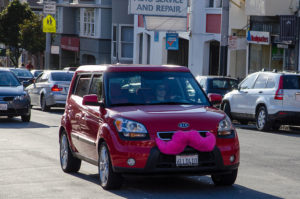Update: A provision to allow large cities and counties to require additional TNC regulations was removed on the state Senate floor. The current version of the bill would undo Seattle’s ordinance and others like it.
As Uber, Lyft and other smartphone app-based transportation services expand services throughout Washington, competing measures in the state House and Senate are working to create a new regulatory system.
 In the Senate, a comprehensive plan has been proposed to establish a statewide permit process, increase insurance requirements and require background checks.
In the Senate, a comprehensive plan has been proposed to establish a statewide permit process, increase insurance requirements and require background checks.
Over in the House, members passed a measure off the floor that only requires ride-share drivers to carry insurance.
Services are launching in cities throughout the state – already in Seattle, Tacoma and Spokane, with plans to expand to Olympia and beyond. As cities decide how to regulate Uber and Lyft, some lawmakers worry the industry could become dysfunctional.
That’s why Sen. Cyrus Habib says he’s sponsoring Senate Bill 5550, which would establish a uniform regulatory framework throughout Washington, with rules for permits, insurance and more. The bill, he says, will help so-called transportation network services avoid the myriad of contradictory regulations taxis face. “We have a chance to get this right on day one,” he said.
But, in its original form, Habib’s bill would have undone city regulations – a problem for those who fought hard for Seattle’s rules.
Taxi drivers last year told Seattle City Council so-called transportation network companies had an unfair advantage without regulations. When council members agreed and voted to cap the number of ride-share drivers, a citizen’s group suspended the ordinance after collecting enough signatures to send the measure to voters.
It took an intervention from Seattle Mayor Ed Murray and months of negotiations between city leaders, taxi companies and ride-share services to come up with a compromise plan.
Habib has since changed his bill, allowing cities with more than 200,000 people or counties with more than 1 million people to require additional permits, impose fees and penalties. “The size limit essentially covers the cities that already have regulations,” Habib said.
After some involved in Seattle’s negotiations opposed Habib’s plan, Rep. Steve Kirby says he came up with one of his own. He says insurance is important and Habib’s bill gets away from that. “It’s just a Christmas tree of every kind of regulation,” he said of Habib’s bill.
So he sponsored a new bill as a “back-up plan,” focusing on the one things he says everyone agrees on – insurance. “My concern was, as that bill was running into rough sailing, it might die and the insurance provisions would die along with it,” Kirby said.
House Bill 2131 would require ride-share drivers to be covered with $1 million liability insurance when they have a customer. The rest of the time, they need only to have personal insurance, at least $50,000 per person and $100,000 per accident.
The state House passed Kirby’s bill last week with a vote of 77-17.
Habib says it’s good to have a back-up plan, but Kirby’s bill isn’t applicable to all ride-share models. “It’s certainly a noble goal to put in play a second vehicle to at least address insurance,” he said. “But it’s a one-size-fits-all bill and the reality of the industry is there are different models.”
Colorado was the first state to pass a law regulating transportation network services. Habib’s bill, which he expects to come to a floor vote early this week, is modeled after the law.